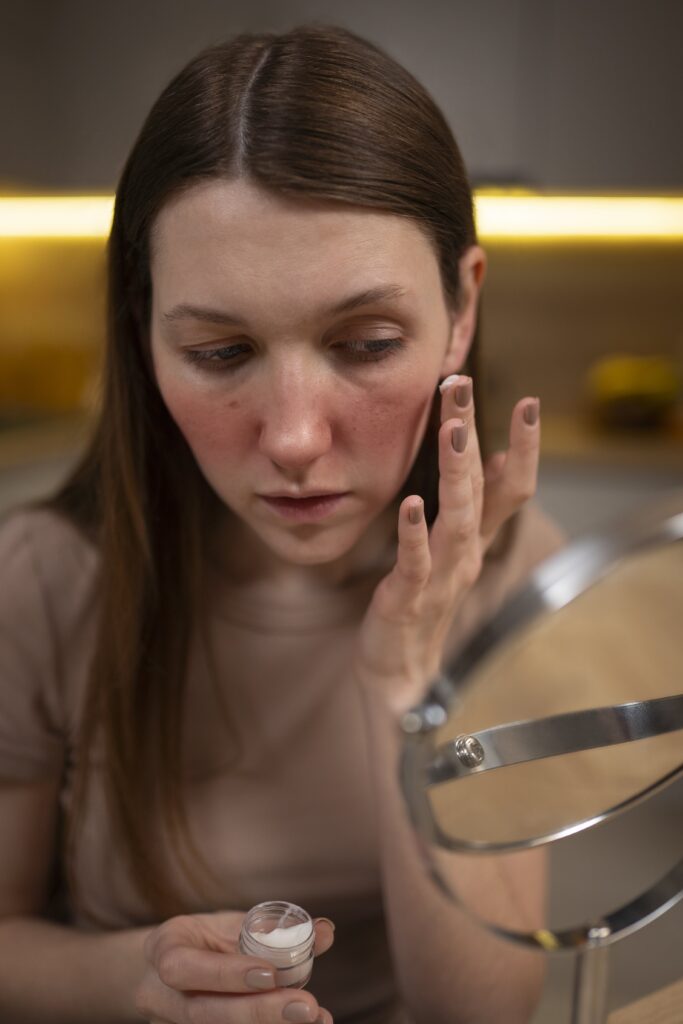If you’ve ever struggled with breakouts, you’ve probably asked yourself questions like is retinol good for acne? or can retinol help with acne? The truth is, retinol is one of the most researched skincare ingredients for treating pimples, clogged pores, and even stubborn scars. When it comes to Unlocking Clear Skin: How to Use Retinol for Acne, the key lies in understanding how it works and how to use it correctly especially for acne-prone skin.
What Is Retinol and How Does It Help Acne?
Retinol, a derivative of Vitamin A, is widely used in dermatology. But you may wonder: how does retinol help acne? By speeding up skin cell turnover, retinol prevents dead cells from clogging pores. This not only helps reduce pimples but also works as a retinol spot treatment for stubborn blemishes.
Whether you’re dealing with whiteheads, blackheads, or even wondering, does retinol help with cystic acne?the answer is yes, though it works gradually. Over time, retinol clears acne and reveals smoother skin underneath.
Benefits of Retinol for Acne-Prone Skin
Using retinol for acne brings multiple benefits beyond just treating breakouts. Here’s why so many people swear by it:
- Retinol clear acne: It unclogs pores and prevents new pimples.
- Reduces acne scars: Especially useful for Unlocking Clear Skin: How to Use Retinol for Acne Scar.
- Controls oil: Perfect for retinol for acne prone skin, as it helps balance excess sebum.
- Improves skin tone: Fades dark spots and hyperpigmentation.
- Anti-aging perks: Smooths fine lines while fighting breakouts.
Whether you ask retinol is good for pimples? or retinol clear skin—fact or hype?, dermatologists confirm that retinol does both: it fights active acne and prevents future flare-ups.
How to Use Retinol for Acne: Step-by-Step Guide
Many people wonder how to use retinol for acne prone skin without breaking out. Here’s a simple method to introduce it safely:
1. Start Slowly
Begin with 2–3 nights per week. This helps your skin build tolerance and prevents irritation.
2. Apply at Night
Retinol should be used at night only. Always pair with sunscreen in the morning.
3. Cleanse and Dry
Wash with a gentle cleanser and apply retinol only to fully dry skin.
4. Use a Small Amount
For retinol spot treatment, dab a small amount directly on blemishes, or spread a pea-sized drop across your face.
5. Moisturize Well
Follow with a non-comedogenic moisturizer to prevent dryness.
6. Be Patient
It may take 8–12 weeks to see results. This is the golden rule in retinol clear skin routines.
How to Use Retinol Without Breaking Out
One of the most common fears is irritation. If you’re wondering how to use retinol without breaking out, follow these tips:
- Use the sandwich method (moisturizer → retinol → moisturizer).
- Never mix with strong acids in the same routine.
- Start with a low concentration before moving up.
- Always wear sunscreen daily.
This way, you’ll unlock the real benefits of retinol without unnecessary side effects.
Who Can Use Retinol for Acne?
Retinol is highly effective for those with oily or acne-prone skin. Even if you’re dealing with cystic acne, retinol may help reduce breakouts over time. However, if you have very sensitive skin, start with the lowest strength and build up gradually.
Pregnant or breastfeeding women should avoid retinol.
Side Effects and How to Manage Them
While retinol clear acne results are promising, the ingredient can cause:
- Redness
- Peeling
- Dryness
- Purging (temporary flare-ups)
To minimize this, begin with retinol for acne prone skin in lower strength and always moisturize after use.
Retinol Layering and Pairing
If you’re building a skincare routine, here’s how to use retinol for acne safely with other products:
Safe with: Hyaluronic acid, niacinamide, peptides, moisturizers
Avoid mixing with: Benzoyl peroxide, strong exfoliating acids, or Vitamin C in the same routine
This makes it easier to achieve retinol clear skin results without overloading your skin barrier.
Unlocking All Skins Nightreign and Retinol
Many brands now incorporate retinol into their night creams and serums. For example, products like Unlocking All Skins Nightreign are specifically designed to improve skin overnight, supporting cell renewal while reducing acne and scars. Such products combine hydration and retinol, making them suitable for beginners.
FAQs About Retinol and Acne
Q1: Is retinol good for acne and pimples?
Yes. Retinol reduces pimples, blackheads, and clogged pores while improving skin texture.
Q2: How does retinol help acne scars?
By boosting cell turnover, retinol fades dark marks and smooths uneven texture, making it effective for Unlocking Clear Skin: How to Use Retinol for Acne Scar.
Q3: Can retinol help with acne overnight?
Not instantly. Retinol works over weeks to clear acne, though it can help calm inflammation gradually.
Q4: Does retinol help with cystic acne?
Yes, though cystic acne may also require prescription-strength retinoids or dermatologist advice.
Q5: How to use retinol for acne prone skin daily?
Start slow, moisturize well, and increase frequency once your skin adjusts.
Final Thoughts
When it comes to Unlocking Clear Skin: How to Use Retinol for Acne, the science is clear—retinol works. Whether you’re wondering is retinol good for acne, how does retinol help acne, or how to use retinol for acne prone skin, the answer lies in patience, consistency, and proper application. From reducing pimples to fading scars, retinol is one of the most effective skincare ingredients for anyone chasing clear, smooth, and radiant skin.

